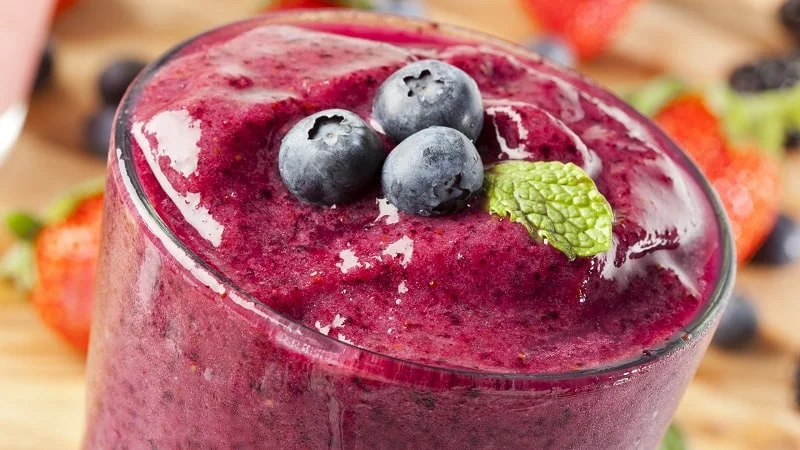We’ve all experienced the discomfort of a sore throat – that scratchy, uneasy feeling that makes swallowing a challenge. When you’re dealing with a sore throat, finding soothing remedies becomes crucial. That’s where the question comes in: “Are smoothies good for a sore throat?”
We all want relief, and knowing that something as simple as a smoothie can help eases our worries. This article dives into the world of smoothies and their potential benefits when you’re dealing with a sore throat. We’ll explore how certain ingredients might offer comfort and discuss the do’s and don’ts to make your journey toward relief a bit smoother.
What is a Sore Throat?
A sore throat is when your throat feels scratchy, hurts, or feels irritated. It’s a common discomfort caused by different things.
You might feel pain when you swallow or talk. Often, a sore throat is a sign of a cold or a flu. It can also come from allergies or irritants, like smoke.
Sometimes, tiny germs called viruses or bacteria are to blame. These little troublemakers can make the back of your throat inflamed and sore.
Symptoms and Signs
When you have a sore throat, you might notice:
- Pain or irritation in your throat
- Difficulty swallowing
- Hoarse or scratchy voice
- Swollen or red tonsils
- Sometimes, a mild cough or runny nose

Read Also: Sore Throat After Wisdom Teeth Removal: A Tough Experience
Common Causes
A sore throat can happen because of:
- Viral infections like the cold or flu
- Bacterial infections like strep throat
- Irritants like smoke or pollution
- Allergies to things like pollen or pets
Are Smoothies Good for a Sore Throat?
Smoothies can be a comforting option when you’re dealing with a sore throat. They have the potential to offer relief and nourishment at the same time. Let’s explore how smoothies can play a part in soothing your discomfort.
Potential Benefits of Smoothies
Smoothies can bring some good things to the table when your throat is sore:
- Easy to Swallow: Smoothies are blended, which means you don’t need to do a lot of chewing. This can be great if swallowing is painful.
- Nutrient Boost: They’re packed with nutrients from fruits, vegetables, and other ingredients. These nutrients can help support your body’s healing process.
- Hydration Help: Smoothies often contain liquids like water, milk, or juice. Staying hydrated is important for healing, and a smoothie can contribute to your fluid intake.
Ingredients to Consider
When making a sore throat-friendly smoothie, think about:
- Soft Fruits: Go for soft and ripe fruits like bananas, peaches, and melons. They blend easily and are gentle on your throat.
- Yogurt or Milk: These can add creaminess to your smoothie and also provide protein and calcium.
- Honey: A spoonful of honey might help soothe your throat. It’s important not to give honey to children under one year old, though.
- Hydration Heroes: Coconut water, herbal teas, or plain water can add liquid and help with hydration.
Blending Tips for Comfort
To make your smoothie more soothing:
- Texture: Blend until it’s super smooth. Small chunks might irritate your throat.
- Temperature: Cold smoothies might not feel great on a sore throat. Let your smoothie sit at room temperature for a bit or use ingredients at room temperature.
Best and Worst Smoothie Ingredients for a Sore Throat
When it comes to making smoothies for a sore throat, some ingredients can help while others might make things worse. Let’s look at which ingredients can be your best friends and which ones you might want to avoid.

Best Ingredients
These ingredients can offer comfort and support to your sore throat:
- Yogurt: It’s gentle on your throat and provides protein and probiotics, which are good for your gut.
- Honey: Known for its soothing properties, a touch of honey might help ease irritation.
- Bananas: They’re soft and packed with vitamins and minerals.
- Peaches: Ripe peaches add sweetness and are easy to blend.
- Aloe Vera: Aloe vera juice might help soothe inflammation. Be sure to get the edible kind.
Ingredients to Avoid
Steer clear of these ingredients that might cause discomfort:
- Citrus Fruits: Oranges, lemons, and other citrus fruits are acidic and could irritate your throat.
- Spices: Spicy ingredients like cayenne pepper or hot sauce might make your throat feel worse.
- Dairy: Milk and dairy products can sometimes increase mucus production, which isn’t great when your throat is already irritated.
- Very Cold Ingredients: Ice or frozen fruits might be too chilly for a sore throat to handle.
Ingredients to Avoid
When you’re dealing with a sore throat, some ingredients in your smoothie might not be your throat’s best friend. Let’s take a closer look at which ingredients you might want to avoid including in your smoothies.
Citrus Fruits
Why to Avoid: Citrus fruits like oranges, lemons, and grapefruits are high in acidity. This acidity can potentially make your sore throat feel more uncomfortable.
Alternative: Opt for fruits with lower acidity levels, like bananas, peaches, or pears.
Read Also: Steroid Shot for Sinus Infection: Is it Effective?
Spices
Why to Avoid: Spices such as cayenne pepper, hot sauce, or even strong spices like cinnamon can be too intense for a sore throat and might cause irritation.
Alternative: If you want to add flavor, consider using mild herbs like mint or a small amount of ginger, which can have soothing properties.
Dairy Products
Why to Avoid: Dairy, including milk and yogurt, can sometimes trigger increased mucus production, which might worsen your throat irritation.
Alternative: If you still want a creamy texture, consider using non-dairy alternatives like almond milk or coconut yogurt.
Very Cold Ingredients
Why to Avoid: Very cold ingredients, like ice or frozen fruits, can cause a shock to your sensitive throat and intensify discomfort.
Alternative: Use ingredients that are at room temperature or slightly chilled. Let your smoothie sit for a short while after blending to reduce the coldness.
Seeds and Nuts
Why to Avoid: Hard and crunchy ingredients like seeds or nuts can be harsh on a sore throat and might be difficult to swallow.
Conclusion
In the realm of soothing remedies for sore throat, smoothies can offer a gentle and nutritious option.
Their blended nature makes them easy to swallow, while the right ingredients can provide comfort and support to your healing process.
Remember, while smoothies can contribute to your overall well-being, they are not a substitute for proper medical care.
If your sore throat persists or worsens, seeking medical advice is essential.
FAQs about Smoothies for a Sore Throat
Can I include citrus fruits in my sore throat smoothie?
Answer: It’s best to avoid citrus fruits like oranges and lemons due to their acidity, which could worsen throat irritation. Opt for non-acidic fruits like bananas or peaches.
Is it okay to use dairy in my smoothie?
Answer: Dairy can sometimes trigger mucus production, potentially worsening your sore throat. Consider using non-dairy alternatives like almond milk or coconut yogurt.
Can I add honey to my smoothie?
Answer: Yes, honey can provide a soothing effect. However, avoid giving honey to children under one year old to prevent the risk of botulism.
What about adding spices for flavor?
Answer: Spicy ingredients like cayenne or hot sauce may aggravate your sore throat. Opt for milder herbs like mint or a touch of ginger.
Are frozen ingredients fine to use?
Answer: Very cold ingredients might be uncomfortable. Let your smoothie sit for a bit to reduce the chill or use room temperature ingredients.
Can I include nuts or seeds in my smoothie?
Answer: Hard and crunchy ingredients might be harsh on your throat. Consider using nut butter instead for a smoother texture.
Should I choose water or milk as the base?
Answer: Both options are fine. Milk can add creaminess, while water keeps things light. Choose what feels better for your throat.
Can smoothies replace medical treatment for a sore throat?
Answer: Smoothies can be a helpful addition, but they are not a substitute for medical care. If your symptoms persist, consult a healthcare professional.
Are there specific smoothie recipes for sore throats?
Answer: There’s no one-size-fits-all recipe. Choose soft fruits, hydration-rich liquids, and gentle ingredients for a soothing effect.
Medical References
- Thomas, M., & Smith, R. (2006). What’s the evidence that NICE guidance has been implemented? Results from a national evaluation using time series analysis, audit of patients’ notes, and interviews. BMJ, 333(7563), 1095-1095.
- Hui, D., Dos Santos, R., Chisholm, G., Bansal, S., Souza Crovador, C., Bruera, E., & Nguyen, L. (2015). Clinical signs of impending death in cancer patients. The Oncologist, 20(5), 681-687.
- Sankar, J., Lotha, W., Isac, A., & Khanna, R. (2006). Assessment of voice and quality of life in patients with early glottic cancer treated with radiotherapy. Journal of Cancer Research and Therapeutics, 2(4), 195-199.
- Elkins, M. R., Robinson, M., Rose, B. R., Harbour, C., Moriarty, C. P., Marks, G. B., & Belousova, E. G. (2006). A controlled trial of long-term inhaled hypertonic saline in patients with cystic fibrosis. New England Journal of Medicine, 354(3), 229-240.
- Shah, K. K., & Tung, R. (2011). Gastrointestinal complications of cancer therapy: a radiologist’s guide to recognition and management. Radiographics, 31(4), 1123-1134.
- Tietz, N. W., & Shuey, D. F. (1969). Serum proteins in health and disease. Medical Clinics, 53(4), 761-770.



